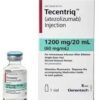On November 16, 2023, the official website of China’s National Medical Products Administration (NMPA) recently announced that the Class 1 new drug Brivitinib enteric-coated capsules (trade name: Wanbirui) submitted by Purao Biotech, a wholly-owned subsidiary of Anshi Biotechnology ®) has been officially approved for the treatment of patients with locally advanced or metastatic non-small cell lung cancer (NSCLC) with mesenchymal-to-epithelial transition factor (MET) exon 14 skipping.
Previously, boricitinib has achieved positive results in key registration clinical studies, with 52 patients with advanced MET exon 14 skipping mutation NSCLC achieving the preset primary endpoint after treatment. In the trial, the patient’s objective response rate (ORR) was 75%, the disease control rate (DCR) reached 96.2%, the median progression-free survival (mPFS) reached 12 months, and the median duration of response (mDOR) reached 15.9 months. . In addition, patients with lung cancer with brain metastases, liver metastases, and elderly patients can all benefit from bricitinib treatment, with ORRs of 100.0%, 66.7%, and 85.7% respectively. Brivitinib had a low incidence of adverse reactions in the trial, an overall good safety profile, and could be recovered or alleviated through clinical management.
Vebreltinib (Bozitinib) is a cell-mesenchymal epithelial transition factor (c-MET) receptor tyrosine kinase inhibitor that can inhibit the proliferation of tumor cells with high c-MET expression. In China, bripretinib has been included in the breakthrough therapy category by CDE and is intended to be used for NSCLC with c-MET exon 14 mutations. After the product was applied for marketing in China, it was included in the priority review by CDE. The indication is for adult patients with locally advanced or metastatic NSCLC with MET exon 14 skipping.
The development rights of bricitinib in China are owned by Purano Biotech. In December 2021, Anshi Bio announced the completion of the acquisition of Puron Bio, thereby incorporating britinib into its research and development pipeline. In other regions outside mainland China, Hong Kong and Macau, the development rights of bripretinib belong to Apollomics.
MET is one of the driver genes of cancer. In NSCLC, cases with MET mutations account for about 3% to 4% of the total. The MET signaling pathway also plays an important role in driving lung cancer to become resistant to other targeted therapies. In addition, researchers have also observed abnormal expression of MET in a variety of cancers, including gastric cancer, hepatocellular carcinoma, etc. This also means that innovative treatments developed for MET targets are expected to have an effect on multiple cancers.















Leave a reply